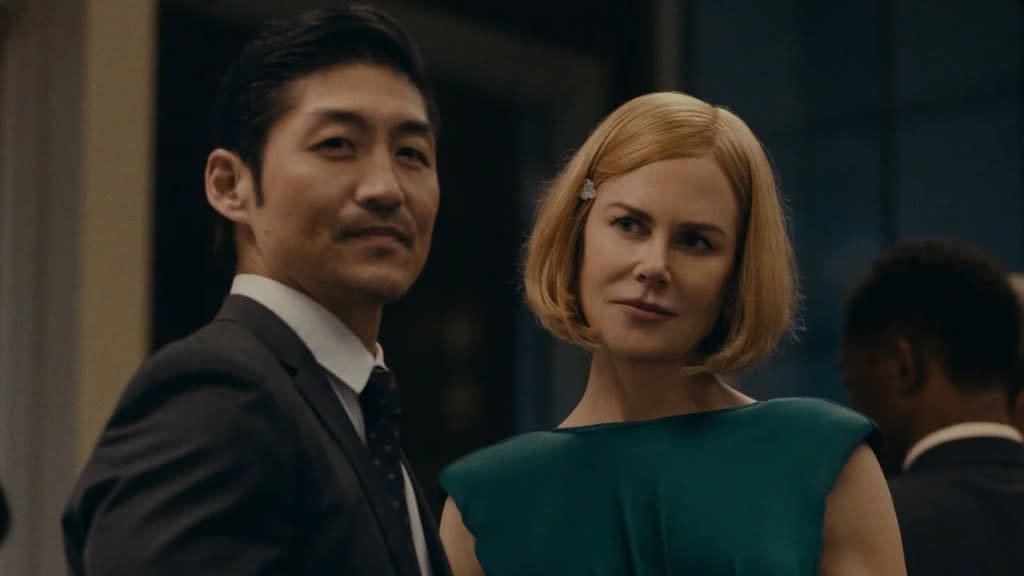‘Expats’ Creator Lulu Wang ‘Wanted to Interrogate’ Who Gets To Use the ‘Triggering Term’

- Oops!Something went wrong.Please try again later.
- Oops!Something went wrong.Please try again later.
Spoilers ahead for “Expats.”
In her television debut, “The Farewell” director Lulu Wang focused on the central question of who gets to use the term “expat.”
Wang adapted the book “The Expatriates” by Janice Y. K. Lee into Prime Video’s six-episode limited drama series “Expats,” with Lee present in the writers’ room. Wang enjoyed the nonlinear style of Lee’s story, but she was more precious about keeping certain parts of the plot than Lee was. The show weaves together the lives of Nicole Kidman’s Margaret, Ji-Young Yoo’s Mercy and Sarayu Blue’s Hilary Starr. While Margaret and Hilary moved to Hong Kong, where the story is set, for their husbands’ jobs, Mercy came after college without a significant other because she couldn’t stand living with her mother.
“The first question was, who gets to be called an expat and why? So I wanted to interrogate that, and I think that it’s a triggering term for many people,” Wang told TheWrap. “Also, there are a lot of people who are technically expats because they’re not in a place permanently. They’re not immigrating there. It would be wrong to call them a migrant worker but they’re also not Western and white, like Mercy. So I wanted to challenge that: ‘Is she an expat”?
Ji-young Yoo felt drawn to the transitory qualities of Mercy
“What drew me to her is how directionless she is. She’s just so lost and she’s kind of stumbling around blind trying to figure out what to do, even before all of the events in the show,” Yoo said. “She just is unmoored, and she’s adrift and I think that was so attractive in a character and so complicated and that was definitely one of the first things that I really liked about Mercy.”
It is this transience that brings Mercy into the lives of Margaret (Kidman) and eventually Hilary (Blue). In between a string of temporary jobs like catering gigs and tutoring, Mercy comes across Margaret’s youngest son Gus on a yacht in Episode 2, which is set a year before Episode 1. Mercy’s prevention of the boy tumbling off the boat wins Margaret’s favor. After the mother goes out of her way to thank the young girl, Mercy capitalizes on the opportunity to offer her babysitting services, should Margaret ever need them. By the end of Episode 2, Margaret’s hostile behavior towards Mercy in Episode 1 gets an explanation. One night later on, Margaret invited Mercy along to watch her children while they go to a night market, but Mercy distractedly lost track of Gus, who was deemed kidnapped, and has been missing for a year.
“The book is nonlinear, and I love that about the book. I love starting with mystery and intrigue and the sense that something dark has happened in this community and we’re not sure what it is,” Wang said. “I just thought it was more tonally interesting to start with putting the audience a year later and meeting the characters a year after the event has occurred. For a long time, we call [Episode 2], ‘Disaster Drops Out of a Clear Blue Sky.’ It explains in a very matter of fact, way what happened in these couple days that led up to this event. And it almost feels sort of mundane, like it could be anything, he could be on a boat or they’re at a restaurant. So we see them in their lives before and I thought that was interesting meeting them in a state of having experienced trauma and still coping with that and then going back and seeing what they were like before.”
Yoo and Blue agreed that the way production took place helped them cultivate their states of isolation because they didn’t spend much time together on set. Despite the big ensemble cast, each character has their own story, which is how Hilary Starr ‘starts before it intertwines with the fate of Gus and by extension, Margaret and Mercy. Her support of Margaret during the loss of Gus juxtaposes with her struggle over whether or not she wants to become a mother.
“What really drew me to Hillary is the mess underneath. I’m always drawn to complicated, complex women who just aren’t what they seem on the surface, or who are what they seem on the surface and are total disasters,” Blue said. “Hilary was such a challenge in the sense that I love to play the disasters because I feel like a disaster to be clear, and I kind of am one, but what I loved about Hillary was she does not show that to the world. She shows this very presentable, pristine image that’s perfectly tailored and curated, and underneath, there’s just all this turmoil and pain and just everything bubbling up. We get to meet her right at the beginning of that and just watch her fall apart throughout the show. That kind of a journey is so exciting to get to sink my teeth into.”
See more of what they had to say about the show below:
The post ‘Expats’ Creator Lulu Wang ‘Wanted to Interrogate’ Who Gets To Use the ‘Triggering Term’ appeared first on TheWrap.

